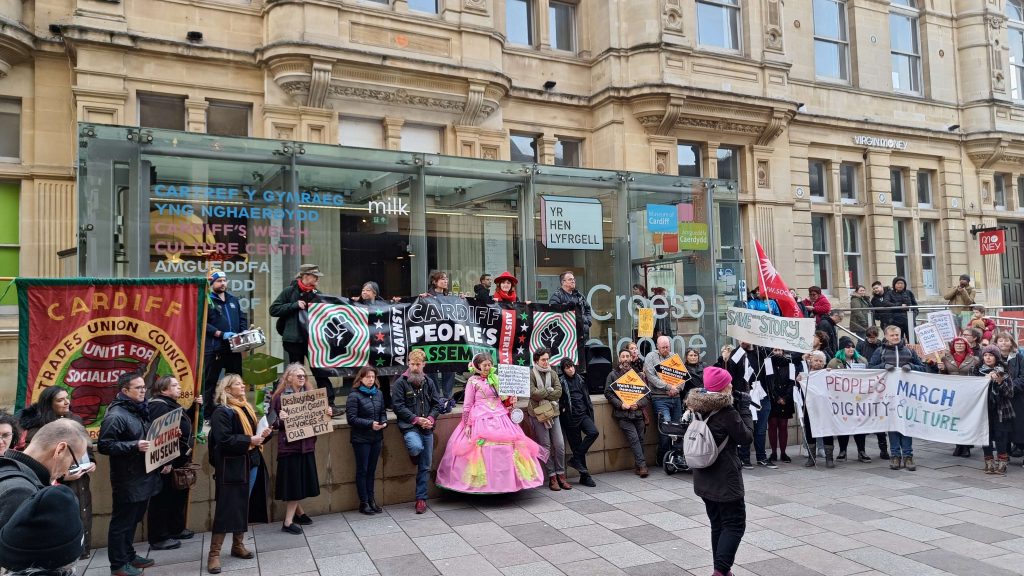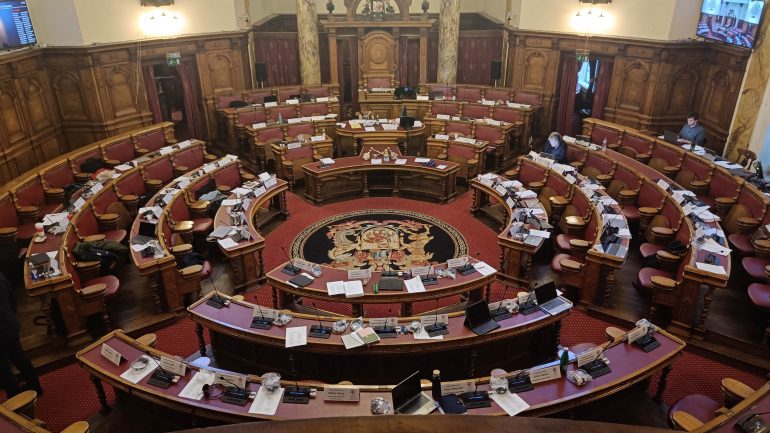The Cardiffian talked to Council Leader Huw Thomas about the scale of the cuts facing Cardiff in the near future
CARDIFF Council is expecting to face a funding shortfall of £113m over the next four years, its leader has warned.
Earlier this year, Cardiff Council faced public protests over proposals to help fill a £23.5m budget gap, but Council Leader Huw Thomas says it now faces one almost five times the size in the coming years.
“The way local government is being funded is unsustainable, as demonstrated by the scale of the gap that we, and other councils, are facing,” said Councillor Thomas.
In December’s Budget Consultation for 2023/24, the council proposed several changes, including reducing library/hub opening hours, making the Museum of Cardiff a remote attraction and leasing St David’s Hall to multinational events company AMG/Live Nation.
- You can read more about Cardiff Council’s 23/24 budget here.
After significant community pushback, the council opted not to pursue the changes to libraries and the museum; instead shifting the cuts to the back-room. Over the next year, more than 150 council workers are now expected to lose their jobs.
The long-term lease deal for St David’s Hall – the National Concert Hall of Wales – looks set to go ahead.

This could have been much worse. Up until a better-than-expected grant from the Welsh Government last December, Cardiff Council was expecting to face a £53m budget gap.
In a recent cabinet meeting Cllr Thomas said that, had the council faced a shortfall of this size, it “would have had to consider getting out of the events business altogether”.
When asked to expand on this by The Cardiffian, Cllr Thomas said: “£53m is currently more than we spend on libraries, waste collection and parks put together.
“You could get rid of all of those services, which obviously we wouldn’t, and still be left with a gap at the end.
“Extrapolate that out to £113m, and you can see the scale of the problem – especially after 10 years of austerity.
“My comment about us getting out of the events industry is indicative of the kind of decisions that we, and other councils across the country, will be facing.
“We have a statutory responsibility to some services. So, as budgets continue to be squeezed, and the demand pressures for social services and schools grow, we’re forced to make really difficult decisions.
“We’re in the invidious position of having to choose between maintaining a level of support in social care for some of the city’s most vulnerable or pulling back from major events – which is often what people associate the council with and provide real value to quality of life in the city.”
We could get rid of libraries, waste collection and parks and still be left with a gap at the end
Around 60% of the £141m in extra demand that the council is expecting to face by 2027/28 comes from either social services (37%) or education (23%).
The current budget projections are largely a function of the UK Conservative Government’s plans to cut public spending in real terms, as they chase their 2028 target of getting public sector debt falling as a proportion of GDP.
However, Cllr Thomas also suggested that he’s looking for a better alternative from the Westminster wing of Labour – his own party.
In the build-up to May’s local elections in England, Labour Leader Keir Starmer has announced that, were his party in government, it would use a windfall tax on energy company profits to fund a council tax freeze over the next year.
As it stands, council tax is going up by 3.95% in Cardiff.
Alongside a fully-funded Council tax freeze, we would need to see a fair and sustainable increase in the block grant
When asked whether Labour’s current announcements were enough, Cllr Thomas said: “Any council tax freeze applied at a central government level has to be fully funded by that government, as it is becoming an increasingly important part of how councils balance their budgets.
“Alongside that, we would also need to see a fair and sustainable increase in the block grant.”
What is a budget gap?
For local councils, a budget gap occurs when the funding received grows more slowly than the amount it would cost to meet current levels of service.
The gap is usually created by either funding cuts, increased spending pressures, or a combination of the two.
Council revenue budgets – which cover expenditure on day-to-day things like wages and bills – are almost entirely funded by either Council Tax or government grants.
For financial year 2023/24, 26% of Cardiff Council’s funding will come from council tax, and 74% from external funding (which is mostly money from Welsh/UK government).
This means that, if they want to address a budget gap by increasing funding, councils need to either get more money from government or increase council tax.
The problem here is that the part of funding that councils don’t control – government grants– is significantly more impactful than the bit that they do control.
With each 1% rise in Council Tax, Cardiff Council raises about £2m. If it wanted to solely cover the anticipated £113m gap like this, Council Tax would have to increase by more than 50% over the next four years – costing the typical Band D property an extra £870 annually.
Of course, there are other ways the council can raise funds. This year, Cardiff is seeing increases to the prices of pay and display parking, residential parking permits and school meals.
The council would also point to some of the more creative fundraising alternatives that it’s come up with. An example given by Cllr Thomas is the Winter Wonderland: “10 years ago, the animation of the City Centre at Christmas cost the council almost £100,000.
“We outsourced that, for want of a better phrase, and we actually now make a revenue from it.
“The operator pays us a fee and that money then means that we can afford not to make savings elsewhere.”
While these smaller solutions help the council to fund things at a micro level, they also have less of an impact than a rise in Council Tax.
The alternative is that the council balances its budget by cutting spending.
These cuts don’t necessarily have to be directly to services. Indeed, when addressing this year’s £23.5m gap, most of the savings the council expects to make are “efficiency savings” – or cuts that don’t directly impact frontline services.
With cuts of this size, however, there is inevitably an impact on what the council is able to do.
This year, we’ve seen it push on with the controversial move to lease music venue St David’s Hall to American multinational AMG/Live Nation, while also narrowly scrapping plans to reduce library opening hours and remove The Museum of Cardiff from The Hayes.
Over the next year, more than 150 council workers are also expected to lose their jobs.
Given that, over the next four years, the council is expecting to have to fill a gap almost five times as big, service cuts could dwarf the ones we’re seeing this year.



